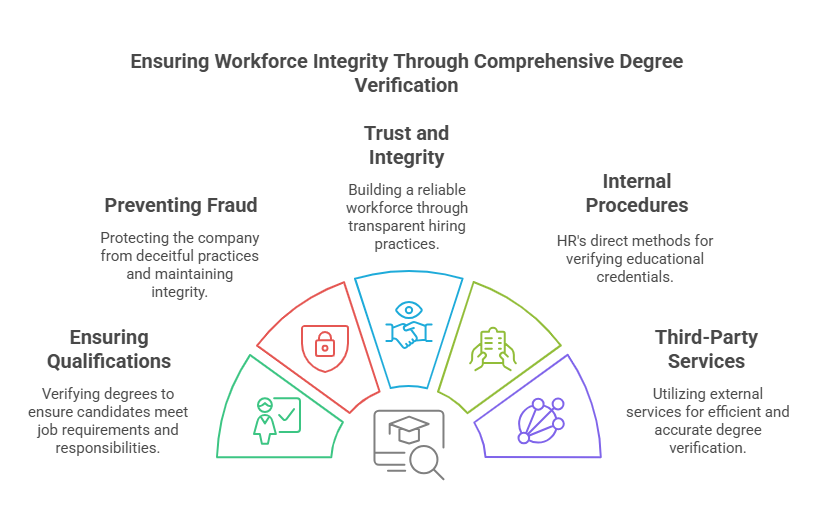Navigating the job market is challenging enough without worrying if your qualifications will be verified. One of the looming questions for many job seekers is: "Do employers really check college degrees?" The short answer is yes. But to understand why and how this process occurs, let's dive deep into the subject of employment background checks and their significance.
Key Takeaways
- Employment background checks verify job titles, responsibilities, dates of employment, criminal history, credit standing, and educational qualifications.
- Verifying college degrees ensures candidates meet the job's educational requirements and prevents the hiring of unqualified personnel.
- Degree verification helps prevent fraud and reinforces a culture of integrity and honesty within an organization.
- Employers use internal procedures, third-party services, and online systems to confirm the authenticity of a candidate's educational background.
- Job seekers benefit from understanding and preparing for degree verification, which promotes transparency and reduces the anxiety associated with background checks.
What Are Employment Background Checks?
Before exploring degree verification, let's cover the basics of employment background checks. These checks are a standard part of the hiring process, designed to confirm the accuracy of the information provided by a job candidate. They are crucial for employers to ensure a safe, qualified, and honest workforce.
- Employment Verification: Confirming previous job titles, responsibilities, and dates of employment.
- Criminal Background Check: Reviewing any criminal record to ensure the candidate won't pose a risk.
- Credit Check: Sometimes required for financial positions.
- Education Verification: Ensuring that the claimed educational qualifications are accurate and legitimate.
According to a FTC, employers must comply with specific regulations when conducting background checks. Interested to learn more? Continue reading the entire article to know the importance of background checks. This will help you understand how it influences the hiring process. At the same time, you will discover the importance of these actions for both employers and job seekers, as well as how openness may promote a positive hiring process.
EXPERT INSIGHT: Ensuring the educational background verification process is transparent and reliable is among the responsibilities of HR professionals like us. It is one of the most important steps in making confident, informed hiring decisions. As HR professionals, we’re not just checking boxes—we’re building trust and integrity between the candidate and the company. For example, verifying educational credentials lays the groundwork for an honest and transparent culture. This is at the core of our role in educational background verification within an organization. - Charm Paz, CHRP
Why Do Employers Check College Degrees?
Ensuring Qualifications
In today’s competitive job market, employers want to be certain that they’re hiring individuals who meet the educational prerequisites for the role. Whether it's a specialized technical position or a management role, having the right credentials is critical. A fake degree can derail projects, harm productivity, and even endanger safety, especially in fields like engineering or healthcare. So, verifying degrees helps employers ensure they are bringing qualified individuals on board who can truly handle the responsibilities of the job.
Preventing Fraud
Degree fraud isn’t just a minor issue—it's a significant concern that can tarnish a company's reputation and lead to legal issues. People attempting to falsify their education background can sometimes slip through the cracks, especially if an employer isn’t diligent in conducting thorough checks. By verifying degrees, employers protect themselves from potential deceit and reinforce a culture of integrity and honesty within their organization. This step is not just about catching dishonest applicants but also about deterring fraudulent activity from the outset.
Trust and Integrity
Building a trustworthy and reliable workforce begins with the hiring process. Ensuring the accuracy of a candidate’s educational claims is a way for employers to demonstrate their commitment to integrity. When employees know that their qualifications were thoroughly vetted, it fosters a workplace environment grounded in trust. This transparency upholds corporate standards and reassures clients and stakeholders that the company hires honest and capable professionals. Verification processes signal that the organization values truthfulness and is steadfast in maintaining high ethical standards.
How Is Degree Verification Conducted?
In this section, we explored three common methods of degree verification: internal procedures, third-party services, and online verification systems. These methods showcase how employers can ensure that their candidates' educational credentials are legitimate, contributing to a more trustworthy and qualified workforce.
Internal Procedure
When it comes to degree verification, one method employers use is internal procedures managed by the Human Resources (HR) department. The process typically begins once a candidate reaches the final stages of the hiring process. Here’s a closer look at how it unfolds:
Direct Contact with Universities
HR personnel will usually start by reaching out directly to the educational institutions listed on a candidate’s resume. This involves contacting the admissions or registrar's office to verify the degree, the date of graduation, and sometimes even the major or concentration. Universities are familiar with such requests and often have streamlined processes to handle them, though response times can vary.
Written Requests
In some cases, HR might send a formal written request for verification. This documentation often includes the candidate’s consent, proof of their identity, and specifics about the information being verified. Some universities require a nominal fee to process these verification requests, which the employer typically covers.
Internal Records Check
If the candidate is an alumnus of a local or affiliated university, the process might be even more straightforward. Internal records or established communication channels between institutions can expedite verification, cutting down on waiting times.
While this method is thorough, it can be time-consuming. For faster results, many employers turn to third-party services, but internal verification remains a trusted method for its accuracy and directness.
Third-Party Services
More commonly, companies utilize third-party services specializing in background and education verifications. These services can quickly confirm degrees by accessing a comprehensive database of educational records. They simplify the vetting process, ensuring accuracy and consistency without burdening the HR department with extensive research. Utilizing third-party verifiers helps maintain objectivity and efficiency, crucial for companies handling a large volume of candidates. These services are adept at spotting fraudulent credentials, as they have advanced tools and direct connections with educational institutions that streamline the verification process.
Online Verification Systems
Some educational institutions participate in online verification systems, where degrees can be checked almost instantly. These platforms allow employers to quickly confirm the authenticity of a candidate's educational qualifications without the back-and-forth of traditional methods. Services like the National Student Clearinghouse and Parchment provide secure, immediate access to academic records. This streamlines the background check process and ensures that employers can rely on accurate information, reducing the risk of hiring someone with falsified credentials.
For job seekers, understanding that employers have such tools at their disposal can be crucial. It underscores the importance of honesty and precision in listing educational achievements. Knowing that a simple online check can verify their credentials should encourage candidates to accurately represent their academic history.

Legal Considerations
Compliance with Laws
Employers navigating the realm of degree verification have to tread carefully, ensuring they comply with a range of federal and state laws. The Fair Credit Reporting Act (FCRA) is a key piece of legislation in this scenario. Under the FCRA, employers must obtain explicit consent from candidates before conducting any background check, including education verification. This step isn't just a formal necessity; it also reflects a respect for personal privacy and legal boundaries.
Equal Opportunity Employment
Another crucial legal aspect is ensuring that the process of verifying college degrees does not unintentionally result in discrimination. The Equal Employment Opportunity Commission (EEOC) provides guidelines to prevent the misuse of background checks. For instance, if an employer mandates degree verification, this requirement must be uniformly applied across all applicants for a particular position. Doing so avoids any accusations of bias and supports a fair hiring process.
Equal Opportunity Employment
The Equal Employment Opportunity Commission (EEOC) ensures that background checks do not result in unfair discrimination. They mandate that employers apply their checks uniformly across all candidates, irrespective of race, color, religion, sex, or national origin. This means that if a company decides to verify educational credentials, it must do so for every applicant applying for the same position to avoid any form of discriminatory practice.
Moreover, the EEOC provides guidelines on how employers can use background checks responsibly without infringing on an applicant’s civil rights. For instance, a conviction found during a criminal background check must be relevant to the job position for it to be a disqualifying factor. This relevance is also scrutinized in the context of educational verification. By following these regulations, employers can focus on hiring qualified individuals while upholding fair hiring practices.
Understanding these legal considerations helps both employers and job seekers appreciate the seriousness of degree verification. It establishes a foundation of trust and transparency, essential for a fair and efficient job market.
Impact on Job Seekers
Peace of Mind
Knowing that your degree will be verified should prompt you to be truthful on your resume. It can serve as a relief for those who've genuinely earned their qualifications, offering confidence that the verification process will affirm their authenticity. More than that, it removes the anxiety of potential discovery for those who might consider embellishing their educational background. In a job market where credibility matters, this layer of scrutiny helps maintain a level playing field. Honesty isn't just the best policy; it's the only policy if you want your application to stand the test of verification.
Career Preparation
Understanding that education verification is a standard practice can motivate job seekers to maintain accurate and honest records of their qualifications. Knowing that your academic history will likely be scrutinized should prompt you to compile and securely store relevant documents like transcripts, diplomas, and any additional certifications. This preparedness not only ensures that you can provide verifiable proof when requested, but also speaks volumes to potential employers about your integrity and attention to detail.
Additionally, if you've had non-traditional educational experiences, such as attending online courses or participating in specialized training programs, make sure to document these thoroughly. Even if they don't appear as traditional degree entries, having a well-documented educational background can only bolster your credibility.
Ultimately, recognizing the inevitability of this verification process can encourage you to approach job applications with a mindset of transparency and diligence, which can only enhance your professional reputation.
Preparing for a Background Check
Accurate Documentation
Ensure that all the information you provide, especially your educational history, is accurate and up to date. Collect your transcripts and any certifications you list on your resume. Double-check dates, degree titles, and the institutions you attended. Any inconsistencies, even small ones, can create unnecessary complications.
Be Transparent
If there are gaps or discrepancies in your educational background, be prepared to explain them honestly during the hiring process. This could mean addressing a semester you dropped out, a change in your major, or even an incomplete degree. Being upfront about your educational history, rather than trying to gloss over or obscure these details, can work in your favor. Employers value honesty and transparency, and providing a clear explanation shows that you are forthright and dependable. It’s better to discuss any anomalies directly rather than allowing them to be discovered during the background check, which could raise red flags and potentially jeopardize your job offer.
Know Your Rights
It's important to be aware of your rights when it comes to background checks, including the verification of your college degree. To start, you have the right to be informed if a background check, including education verification, is being conducted. This notification must be given in writing, usually as part of the hiring process documents you sign.
If the results of a background check influence a hiring decision, you're entitled to know the specifics. Employers are required to provide you with a copy of the report and inform you of your right to dispute any inaccuracies. This is mandated by the Fair Credit Reporting Act (FCRA), which sets the legal framework for how background checks should be conducted.
Should you find any discrepancies or inaccuracies in the results, you can challenge them. Contact the reporting agency to correct errors and inform the potential employer about the dispute. Throughout this process, the employer must hold off on making any final hiring decisions until the issue is resolved.
Finally, you have the right to privacy concerning your personal data collected during a background check. Employers and third-party services must handle this information securely and use it solely for its intended purpose. Understanding these rights not only empowers you to maintain control over your personal information but also ensures a fair and transparent hiring process.
Services and Resources
Numerous services and resources, such as National Student Clearinghouse and other degree verification services, can assist both employers and job seekers in validating educational qualifications. These third-party services streamline the verification process by accessing a vast database of educational records, making it quicker and more reliable than contacting educational institutions directly.
The National Student Clearinghouse, for instance, offers a comprehensive degree verification solution that benefits both parties. Employers get quick confirmations, and job seekers have a reliable method to authenticate their credentials.
For job seekers, staying proactive by keeping updated records and knowing the available resources can significantly ease the process. Accessing official transcripts, certifications, and verification services through your alma mater or established verification platforms ensures you’re prepared for any background check that comes your way.
Understanding and utilizing these resources facilitates transparency and fosters trust and integrity in the hiring process, ultimately benefiting both employers and job seekers.
Frequently Asked Questions (FAQ)
How do employers verify college degrees?
Employers typically verify college degrees through background checks, which may involve contacting the university to confirm attendance and graduation status. Some use third-party verification services that specialize in authenticating educational credentials.
Do all employers check educational background?
Not all employers check educational background, but many do, especially for positions requiring specific degrees or certifications. The importance of educational verification varies between industries and job roles.
What happens if a degree is not verified?
If a degree cannot be verified, employers may request additional documentation, such as transcripts, or contact the educational institution again. Failure to verify a degree might lead to disqualification from the hiring process.
Can a job offer be rescinded if education is not verified?
Yes, a job offer can be rescinded if an employer cannot verify an applicant's educational background. Accurate and truthful information is crucial in the hiring process, and discrepancies can result in the withdrawal of an offer.
How far back do employers check education?
Employers usually check the highest degree attained, though some may verify multiple degrees if relevant. Typically, they focus on credentials related to the job applied for, irrespective of when they were obtained.
Can a fake degree be caught during a background check?
Yes, a fake degree can often be caught during a background check. Verification services and direct contact with educational institutions can uncover fraudulent claims, which may have serious repercussions for the applicant.
Conclusion
Employers checking college degrees is a routine part of the background check process, designed to ensure the integrity and qualifications of potential employees. By understanding this process, job seekers can better prepare themselves for the scrutiny they might face and maintain accuracy and honesty in their applications. Adequate preparation and transparency can lead to a smoother hiring process and a more trustworthy professional reputation.
By staying informed and prepared, both employers and job seekers can navigate the complexities of degree verification with ease.

GCheck Editorial Team
Meet the GCheck Editorial Team, your trusted source for insightful and up-to-date information in the world of employment background checks. Committed to delivering the latest trends, best practices, and industry insights, our team is dedicated to keeping you informed.
With a passion for ensuring accuracy, compliance, and efficiency in background screening, we are your go-to experts in the field. Stay tuned for our comprehensive articles, guides, and analysis, designed to empower businesses and individuals with the knowledge they need to make informed decisions.
At GCheck, we're here to guide you through the complexities of background checks, every step of the way.






